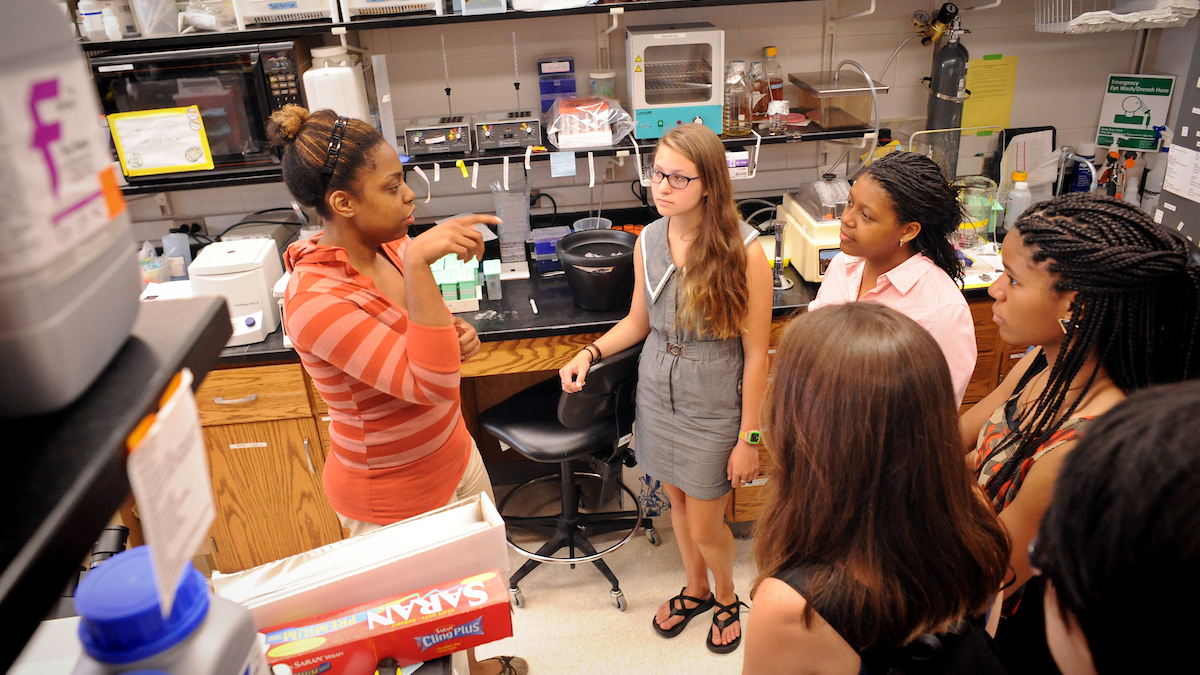Carolina’s success reveals keys to increasing STEM diversity
A new paper in Science, co-authored by several Carolina professors, measures the impact of Chancellor’s Science Scholars, one of two programs in the nation to successfully replicate the Meyerhoff model for inclusive STEM excellence in higher education.

Research shows that Latinx and black students are more likely than their white peers to leave STEM majors.
The University of North Carolina at Chapel Hill is determined to change that.
The Chancellor’s Science Scholars program, launched in 2013, recruits high-achieving students from diverse backgrounds and sets them up for success by providing an inclusive space for minority students in science. The results so far are promising.
A new paper co-authored by several Carolina professors and former Chancellor Carol L. Folt and published in Science outlines the program’s impact for the first time.
The Chancellor’s Science Scholars, and a similar program at Pennsylvania State University, are both modeled after the Meyerhoff Scholars Program at the University of Maryland, Baltimore County and have already begun to increase retention and academic performance of underrepresented students in STEM.
A study across the three campuses showed that students in these programs remained in their majors 91% to 94% of the time, compared to 78% to 80% for non-participants.
So, what’s the common denominator? The programs offer intensive advising, immersive transition activities the summer before the students enter college, leadership champions and training for faculty and staff.
“One of the greatest pleasures was my association with Carolina’s CSS program, and most importantly, with these amazing students,” said Folt, who championed and greatly expanded the program during her time at Carolina. “As I got to know each of them well throughout the course of the year – learning about their aspirations and witnessing their amazing talents – I could see the future in their eyes and hear it in their voices. Their love of learning, research and making a difference in our world was exhilarating and inspirational.”
Abigail Panter, senior associate dean for undergraduate education and a co-author of the paper, said the key to success has been identifying the unique challenges underrepresented students face and nurturing their talents by “caring for them as brothers and sisters.”
“As a University, we chose to implement all of the program components, not just the ones that were easy,” she said.
The Chancellor’s Science Scholars program also offers financial support, one-on-one mentorship, research opportunities and other benefits to build a more inclusive and diverse STEM community.
Based on early outcomes, Carolina’s program is on track to surpass Meyerhoff’s early rates of entry into master’s and doctoral programs. Program faculty will continue to learn from students’ experiences as the scholars pursue careers and further education in the sciences.
“Carolina is a place that changes lives,” said Viji Sathy, co-author and program evaluator. “To me, this program is the embodiment of that ideal. But in this case, I’d say it doesn’t simply change the lives of students who may go on to get their Ph.D.s or M.D.s, but it also touches the lives of all they go on to serve in those roles.”
As the first cohorts of Chancellor’s Science Scholars go on to be doctors, professors, biotech leaders and more, program faculty and staff look forward to watching them bring innovation to the world.
“For me, the success of this program has extraordinary implications,” said Thomas Freeman, co-author and executive director. “Long-term success could result in a substantive improvement in access to opportunities in STEM leadership, as well as innovations that lead to a brighter future for all kind.”




